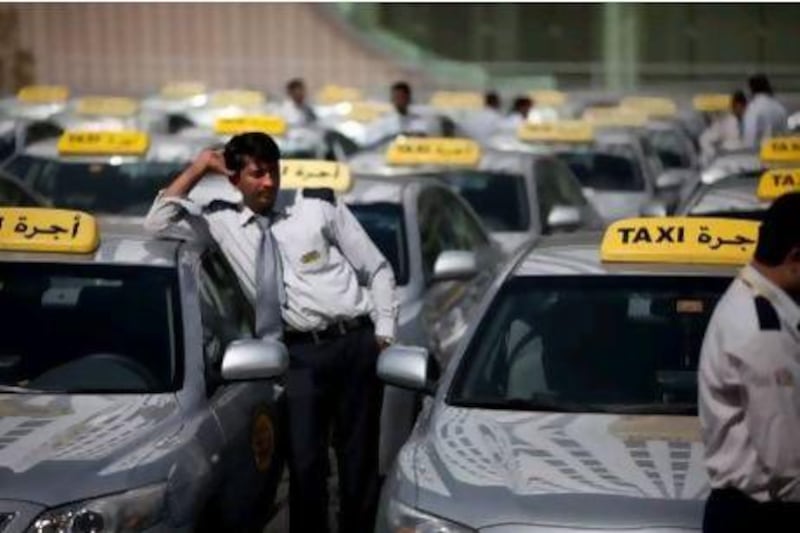ABU DHABI // When taxi fares were increased at the start of the month, drivers hoped they would benefit. But instead, the increased revenue is being clawed back by their employers in the form of new surcharges.
From May 1 the starting charge for a taxi ride rose 50 fils, to Dh3.50 during the day and 40 fils, to Dh4 at night.
When The National looked at the meter of the taxi being driven by Mainuddin Shamsuddin, 27, a Bangladeshi driver with National Taxi, his total fares for the day amounted to Dh544, but his net income was just Dh519.
The difference is a company charge for each kilometre he drives - a fee that did not previously exist.
"It's 9 fils for every kilometre," he said. "But 9 fils is nothing. "
National Taxi does not set a daily target for its drivers. Instead, they take home 30 per cent of their fares each month.
The general manager of National Taxi declined to discuss commissions or surcharges, referring queries to TransAD, the taxi regulator.
Rodel Inosanto, 35, a Filipino driver with Tawasul, was unclear about the purpose of the surcharge, but suspected it was a tax.
The day The National spoke to him he was charged Dh16.50; the previous day, Dh14.75. "It's OK as long as the company doesn't change the commission bracket," he said.
His basic salary is Dh1,000 a month. On top of that he gets a "senior" allowance for having worked for Tawasul for more than three years, and a Dh250 bonus if he takes Dh11,000 in fares in a month. "Our daily target is Dh350," he said, "but I try to reach the Dh11,000 mark so I can get at least a 13 per cent commission."
Before the increase, his daily fares were between Dh300 and Dh400. After, it rose to Dh450 or Dh500. "It's very hot so people are using taxis," he said. "I'm not sure if we'll get more passengers when the weather gets cold."
Meanwhile, Dan Bahadur Gharti, 29, a Nepalese driver with National Taxi, does not expect an increase in his pay this month.
Before May 1, he had 40 to 45 customers, taking Dh350 to Dh400 a day in fares. "When we started increasing the fares, I had 20 to 25 customers a day but got the same amount," Mr Gharti said.
The biggest blow, drivers say, has been losing tips at night. The new minimum Dh10 fare after 10pm means customers taking short journeys rarely tip beyond that - whereas previously drivers usually got to keep the change.
"Before, we got Dh30 to Dh40 tips [total] every day, which we used to buy food and phone cards," said Mr Gharti.
MA, 30, a driver from Bangladesh who works for National Taxi, averages Dh500 in fares during a 14-hour day, up from Dh350. But the loss of tips and a daily surcharge of about Dh20 means his take-home pay has actually fallen by 5 per cent.
"Sometimes we get Dh1 or Dh2 [tip]. Now night time we are not getting even 25 fils," he said.
T, a Nepalese driver also with National Taxi, previously earned about Dh1,000 in tips a month - a quarter of his income. He lived on his tips, allowing him to send his pay home. Now, his tips have gone. "It's all going to the company now," he said.
An Al Ghazal driver, Hari Prasad Sharma, 38, from Nepal, said many customers were unhappy with the higher fares. "Some are angry and don't give tips anymore. Now I only get Dh5 to Dh6 a day."
He called for a unified driver contract across all six taxi franchise-holders. "It will be good for all drivers of the silver taxis," he said. "We follow the same rules so we should have the same salary."
A spokesmen for one of the taxi companies, who asked that neither he nor his company be identified, said drivers should benefit.
"We have increased the fare and the drivers will get the benefit," he said. "The main aim is that the driver has to work less time.
"We are expecting better driver salaries. It is the same commission structure, we have not given any more pressure on the driver."
azacharias@thenational.ae






